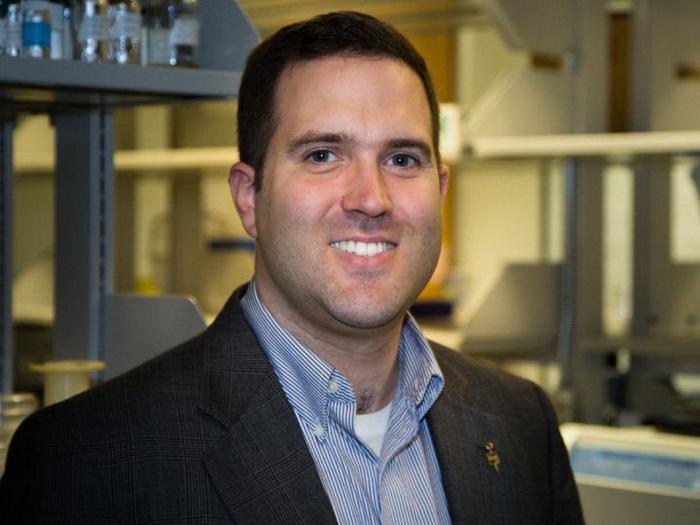Jeffrey Rimer, Abraham E. Dukler Professor of Chemical Engineering, known globally for his seminal breakthroughs that control crystals to help treat malaria and kidney stones, has been awarded an inaugural $5 million Catalyst for Discovery Program Grant from The Welch Foundation, to establish the Welch Center for Advanced Bioactive Materials Crystallization.

Credit: University of Houston
Jeffrey Rimer, Abraham E. Dukler Professor of Chemical Engineering, known globally for his seminal breakthroughs that control crystals to help treat malaria and kidney stones, has been awarded an inaugural $5 million Catalyst for Discovery Program Grant from The Welch Foundation, to establish the Welch Center for Advanced Bioactive Materials Crystallization.
The new grant program, open to all Texas institutions, is meant to accelerate progress in fundamental chemical research. Grants are awarded to “highly meritorious proposals aimed at significant problems at the leading edge of chemistry.”
The Welch center at the University of Houston aims to improve understanding of the intricate crystallization processes, inventing fresh ways, both through experiments and computer simulations, to predict and manage how crystals form.
“Knowledge gaps in the nascent and rapidly developing field of nonclassical crystallization present a wide range of obstacles to design crystalline materials for applications that benefit humankind, spanning from medicine to energy and the environment,” said Rimer, the center’s director. “Success calls for a paradigm shift in the understanding of crystal nucleation mechanisms and structure selection that will be addressed in this center.”
Nucleation is the process when atoms, ions or molecules come together to form an ordered material with the same structure as a crystal. For centuries it was believed that crystals nucleate through the assembly of molecules in solution. Within the last decade it has become more evident that the predominant pathway for nucleation is the initial formation of a precursor (liquid or solid) that densifies the molecules, which then nucleate.
“These nonclassical pathways present new challenges to understand the factors that drive precursor assembly, the origin of crystalline ordering within these phases and to develop novel methods to control nucleation,” said Rimer.
Controlling the early-stage processes of crystallization will come first and then the center will address several other grand challenges facing crystal materials synthesis including predicting the structure(s) of the emerging crystals, and selectively altering the transformations between crystals structures.
Researchers at the newly formed center were strategically selected with unique but highly complementary expertise in crystallization, materials synthesis, characterization and modeling. The team includes Peter Vekilov, Moores Professor, chemical and biomolecular engineering, Alamgir Karim, Dow Chair and Welch Foundation Professor, chemical and biomolecular engineering; T. Randall Lee, Cullen Distinguished University Chair, chemistry; Jeremy Palmer, Ernest J. and Barbara M. Henley Associate Professor, chemical and biomolecular engineering; Gül Zerze, chemical and biomolecular engineering; and Francisco Robles Hernandez, professor of engineering technology.
A common problem in crystallization is the formation of polymorphs, which are crystals with the same chemical formula, but a different arrangement of atoms, ions or molecules. Professor Vekilov will lead the team to solve two problems related to crystal polymorphism: predicting the possible crystal structures of compounds of interest and controlling the transformations between polymorphs.
“These studies are necessitated by a fundamental property of crystals – the fact that a compound can form multiple crystal structures. This issue becomes more complicated because many compounds tend to include solvent molecules in their crystal structure and create solvates,” said Vekilov.
Professor Lee’s research team will create specially designed nanoparticles with specific surface properties and chemical characteristics. These nanoparticles will serve as templates for growing bioactive organic crystals on a large scale.
“Support from The Welch Foundation has led to important advances in the field of chemistry, not only within Texas, but also throughout the United States and the world as a whole,” said Lee. “These advances extend beyond scientific discoveries and into the realm of education, where support from The Welch Foundation has played a significant role in building the technological workforce needed to solve ongoing and emerging problems in energy and health care.”
Each year, The Welch Foundation plans to award two Catalyst Grants of up to $5 million dollars each. However, four grants were awarded for the inaugural year, with the University of Houston receiving funding for two projects. In addition to Rimer’s grant, Megan Robertson, UH professor of chemical engineering, received $4 million to develop innovative chemical processes to transform plastic waste into useful materials.
“For the University of Houston to be recognized with two highly competitive Welch Foundation Catalyst Grants underscores the exceptional talent and dedication of our researchers and their commitment to making meaningful contributions to society through discovery,” said Diane Chase, UH senior vice president for academic affairs and provost.




